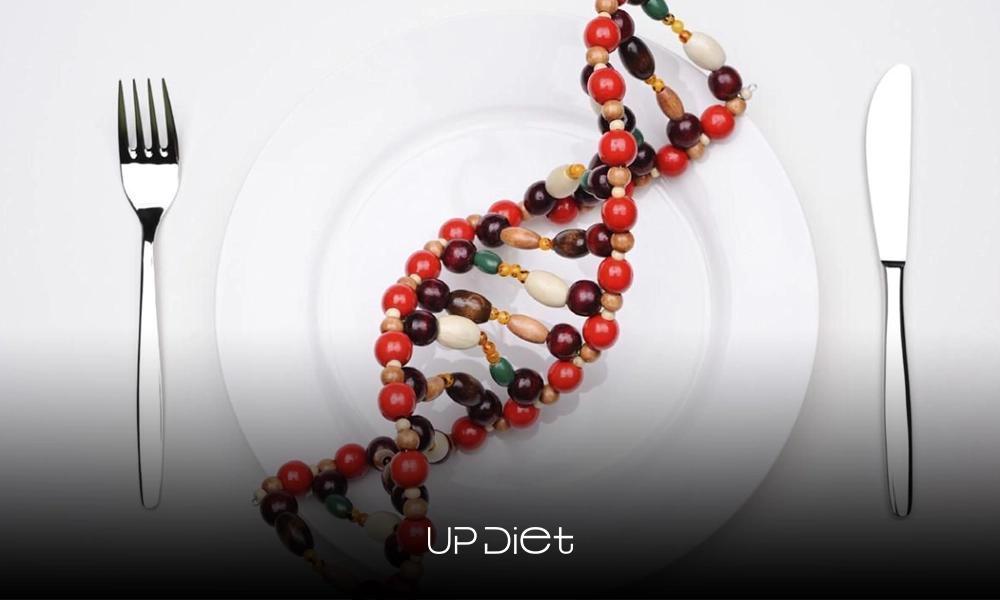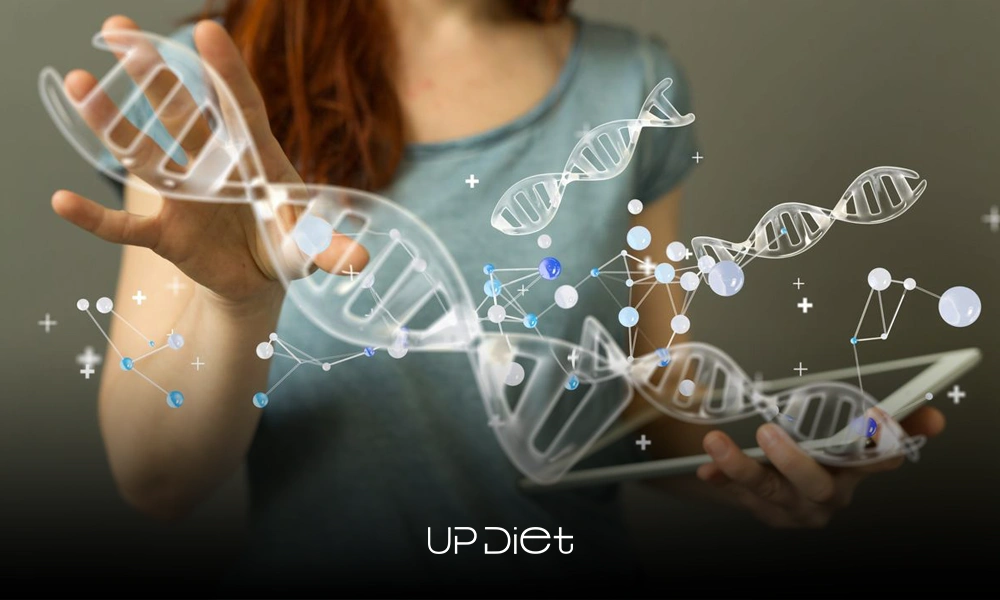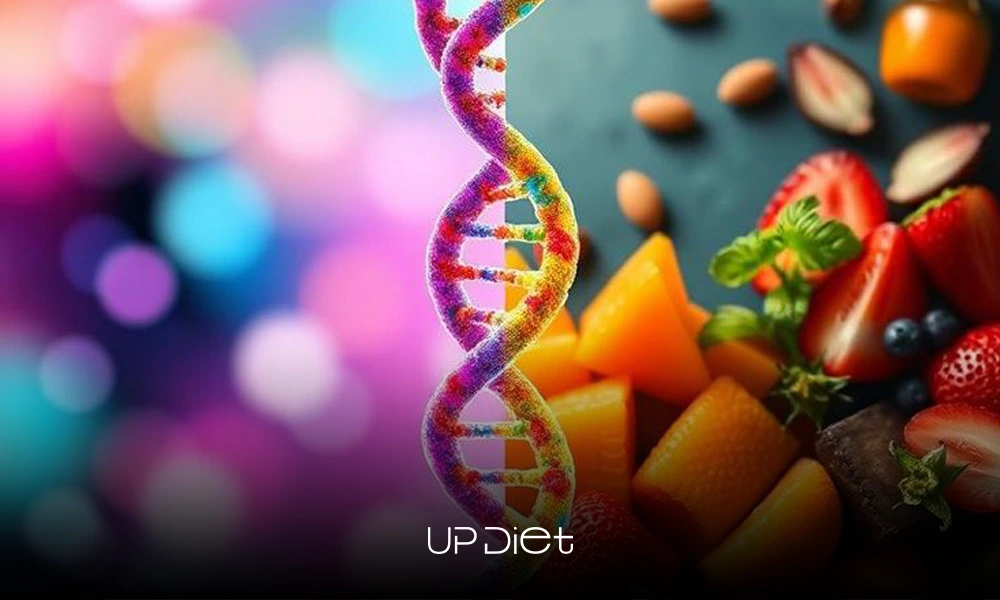Get a plan made for your unique body and goals
Is Your DNA Stopping Every Diet You Try? The Truth Behind Genetic Nutrition

The first commercial DNA-nutrition tests were introduced in the early 2000s. However, the complete translation of research into a reliable DNA-based diet is still emerging. Why? Because after years of trial-and-error dieting, everyone’s eager to get answers from their genes.
In this article, we’re going to cut through the hype and explain what your genetics can actually tell you about food, and what they can’t.
What Is a DNA-Based Diet?

DNA-based nutrition, also called DNA-informed or nutrigenetic diet, is a dietary plan that uses information about genetic variants to tailor nutrition recommendations.
- It claims to surpass general guidelines by customizing macronutrient ratios, food types, and meal timing based on your genotype (a variant of a particular gene).
- It’s based on the analysis of genetic markers (such as single-nucleotide polymorphisms, or SNPs) that affect your metabolism, nutrient absorption, or food sensitivities.
- Depending on the provider, it’s paired with personalized meal plans, grocery lists, or apps that interpret your genetic report into actionable diet tips.
What Can DNA Actually Tell About Nutrition?
DNA tests offer helpful insights into how your body (might) respond to specific nutrients or foods(karger). Here are a few examples of what genetic information can reveal:
- Fat metabolism: Some genotypes influence how efficiently you oxidize fats or store them, indicating you’ll respond better to a higher-fat diet than another option.
- Carbohydrate/Glucose handling: Certain gene variants impact insulin sensitivity or glycemic response to carbs, which act as potential guides for carbohydrate targets.
- Caffeine metabolism: Genes like CYP1A2 affect how fast you break down caffeine, informing how much coffee or tea is safe or beneficial for you.
- Lactose intolerance: Some genetic markers indicate reduced lactase production and, therefore, dairy sensitivity.
- Gluten response: Celiac disease involves specific HLA genotypes, but genetics may flag increased risk of gluten or wheat sensitivity (though evidence is weaker).
- Vitamin/Mineral metabolism: Variants in genes that impact metabolizing folate, B12, choline, or vitamin D. This suggests different dietary needs or absorption levels.
- Food sensitivities: Some genes influence how well your body absorbs nutrients (e.g., fatty acids and antioxidants) or how it reacts to high-salt foods, saturated fat, or alcohol.
Limitations and Misconceptions

DNA-based nutrition has notable potential but also limitations and common misunderstandings. Here’s what this approach cannot reliably tell you (yet, at least):
- It can’t predict behavioral factors such as how motivated you’ll be or how well you’ll stick to a diet.
- It doesn’t fully account for environmental influences such as sleep quality, stress, exercise habits, and access to healthy foods.
- It can’t reliably predict complex traits such as weight loss or changes in body composition.
- It usually doesn’t incorporate microbiome or epigenetic changes, which can regulate gene expression.
- It’s not a replacement for nutrition fundamentals. Regardless of genotype, studies still support eating enough vegetables, limiting added sugars and saturated fats, and being physically active.
Is DNA-Based Nutrition Useful in Real Life?
The short answer would be ‘yes’, but with strong caveats. While DNA-based nutrition can help in certain situations, it’s not a standalone solution.
- Where it helps: Improving engagement and ownership of one’s diet, plus providing helpful advice for clear genetic traits (like lactose or caffeine tolerance), especially in people with specific metabolic issues.
- Where it falls short: Studies (like this one from PubMed) show it rarely improves weight-loss results compared to standard diets. Additionally, genetics accounts for only a small part of the differences in how people respond to food.
- Why it’s not enough: Behavior, environment, lifestyle, and microbiome play bigger roles than genes alone. Genetic tests don’t capture all relevant variants (rare ones, regulatory regions, epigenetics), or how genes are expressed in your body right now.
Alternative or Complementary Personalization Methods

Because of its limitations, it makes perfect sense to either combine DNA-based diets with other approaches or consider other personalization methods entirely.
- Microbiome-based nutrition: Personalized nutrition is a broad category, and this specific branch has gained significant traction recently. This approach analyzes your gut microbiome and how it processes food to create an individualized diet.
- Data-driven personalization: Studies show that even identical twins respond differently to food, underscoring the importance of non-genetic factors. So, this method uses real-time personal data (blood sugar responses, lipid levels, resting metabolic rate, etc.) to plan diets more practically.
- Hybrid personalized nutrition providers: Some companies, like UpDiet, combine multiple data streams (DNA, microbiome, biomarkers, lifestyle data) for a comprehensive approach that integrates into daily routines.
Final Thoughts
If you’re struggling with standard diets, insights from genetics might give you the ‘push’ that you need. However, it’s better not to expect dramatic, definite results without considering your gut microbiome, activity, stress, sleep, and other lifestyle/environmental factors.
- In this post:
- What Is a DNA-Based Diet?
- What Can DNA Actually Tell About Nutrition?
- Limitations and Misconceptions
- Is DNA-Based Nutrition Useful in Real Life?
- Alternative or Complementary Personalization Methods
- Final Thoughts



